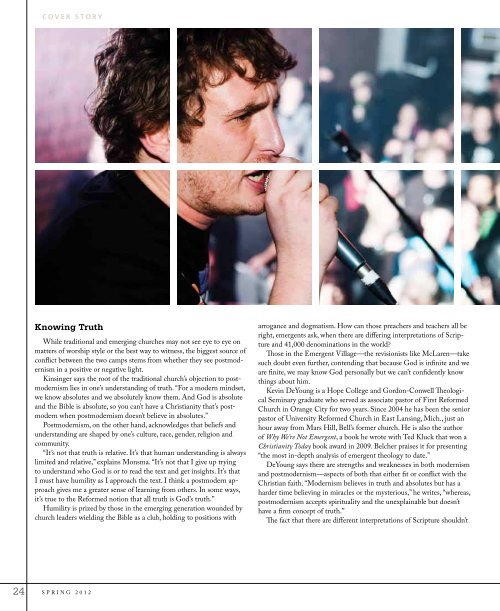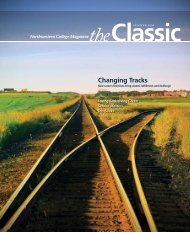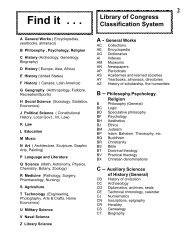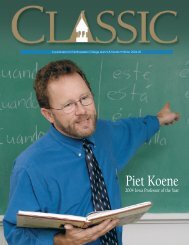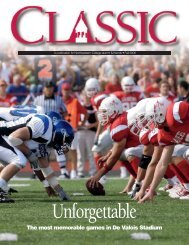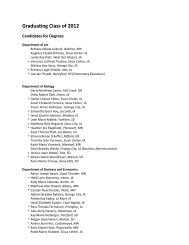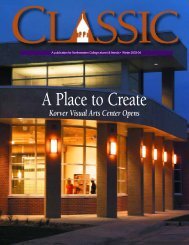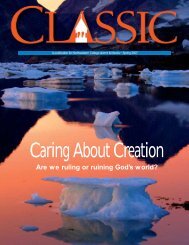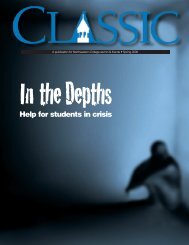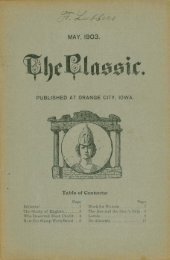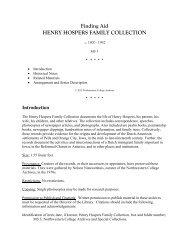Following Jesus - Northwestern College
Following Jesus - Northwestern College
Following Jesus - Northwestern College
You also want an ePaper? Increase the reach of your titles
YUMPU automatically turns print PDFs into web optimized ePapers that Google loves.
COVER STORY<br />
COVER STORY<br />
Knowing Truth<br />
While traditional and emerging churches may not see eye to eye on<br />
matters of worship style or the best way to witness, the biggest source of<br />
conflict between the two camps stems from whether they see postmodernism<br />
in a positive or negative light.<br />
Kinsinger says the root of the traditional church’s objection to postmodernism<br />
lies in one’s understanding of truth. “For a modern mindset,<br />
we know absolutes and we absolutely know them. And God is absolute<br />
and the Bible is absolute, so you can’t have a Christianity that’s postmodern<br />
when postmodernism doesn’t believe in absolutes.”<br />
Postmodernism, on the other hand, acknowledges that beliefs and<br />
understanding are shaped by one’s culture, race, gender, religion and<br />
community.<br />
“It’s not that truth is relative. It’s that human understanding is always<br />
limited and relative,” explains Monsma. “It’s not that I give up trying<br />
to understand who God is or to read the text and get insights. It’s that<br />
I must have humility as I approach the text. I think a postmodern approach<br />
gives me a greater sense of learning from others. In some ways,<br />
it’s true to the Reformed notion that all truth is God’s truth.”<br />
Humility is prized by those in the emerging generation wounded by<br />
church leaders wielding the Bible as a club, holding to positions with<br />
arrogance and dogmatism. How can those preachers and teachers all be<br />
right, emergents ask, when there are differing interpretations of Scripture<br />
and 41,000 denominations in the world?<br />
Those in the Emergent Village—the revisionists like McLaren—take<br />
such doubt even further, contending that because God is infinite and we<br />
are finite, we may know God personally but we can’t confidently know<br />
things about him.<br />
Kevin DeYoung is a Hope <strong>College</strong> and Gordon-Conwell Theological<br />
Seminary graduate who served as associate pastor of First Reformed<br />
Church in Orange City for two years. Since 2004 he has been the senior<br />
pastor of University Reformed Church in East Lansing, Mich., just an<br />
hour away from Mars Hill, Bell’s former church. He is also the author<br />
of Why We’re Not Emergent, a book he wrote with Ted Kluck that won a<br />
Christianity Today book award in 2009. Belcher praises it for presenting<br />
“the most in-depth analysis of emergent theology to date.”<br />
DeYoung says there are strengths and weaknesses in both modernism<br />
and postmodernism—aspects of both that either fit or conflict with the<br />
Christian faith. “Modernism believes in truth and absolutes but has a<br />
harder time believing in miracles or the mysterious,” he writes, “whereas,<br />
postmodernism accepts spirituality and the unexplainable but doesn’t<br />
have a firm concept of truth.”<br />
The fact that there are different interpretations of Scripture shouldn’t<br />
surprise us, DeYoung says. People hold<br />
differing viewpoints in any field of human<br />
inquiry, including science. “If we can’t know<br />
anything about the Bible because people<br />
disagree,” he reasons, “then we can’t know<br />
anything about anything, because people<br />
disagree about every single thing under the<br />
sun.”<br />
Such disagreements have admittedly<br />
contributed to the thousands of denominations<br />
in the world today, but DeYoung<br />
points out that in mainstream evangelicalism,<br />
there are more similarities than differences,<br />
“and certainly similarity and agreement<br />
on the core essentials of the faith.”<br />
Agreement on those core essentials is<br />
possible, he says, “because God has spoken to us clearly and intelligibly<br />
and has given us ears to hear his voice. Christianity is based upon, and<br />
the whole Bible assumes, a certain knowledge of and adherence to confident<br />
assertions about God and his Christ.”<br />
Belcher, too, believes the Scriptures are clear on what he calls “the<br />
first-tier doctrines of the Great Tradition” as outlined in the Apostles’<br />
Creed. It’s those first-tier doctrines that can help determine if someone<br />
remains orthodox, he says, while second-tier doctrines—those that are<br />
distinctive from one denomination to another—should be held with<br />
humility rather than used to divide.<br />
From Emerging to Missional<br />
Emerging church author and pastor Dan Kimball maintains that<br />
those essential core doctrines can be held with “bold confidence.”<br />
“In fact, I believe emerging generations are looking for something to<br />
believe in,” he says. “I believe they are looking for truth, and when we<br />
have something we know is true, we should clearly and boldly say it.”<br />
DeYoung thinks the emerging church movement lost followers when<br />
McLaren and other revisionists moved from evangelicalism and historic<br />
orthodoxy to classic liberalism, equating right living with right belief.<br />
But without faith in the person and work of <strong>Jesus</strong> as the only access to<br />
God and the only atonement for sins—without the new life that comes<br />
Emerging generations are looking<br />
for truth, and when we have something<br />
we know is true, we should<br />
clearly and boldly say it.<br />
from the indwelling of the<br />
Holy Spirit—there can be<br />
no right living.<br />
“If orthodoxy [only]<br />
means I live the right way,<br />
the way of <strong>Jesus</strong>, I have no<br />
hope,” DeYoung writes.<br />
“Just a call to live rightly<br />
and love one another<br />
won’t sustain and propel a gospel-driven church, because it isn’t the<br />
gospel.”<br />
Belcher tells of discussing the relationship between believing in <strong>Jesus</strong><br />
and living for <strong>Jesus</strong> with his mentor, Richard Mouw. Mouw replied that<br />
it’s not a matter of balance but more a matter of priority, that justification<br />
or penal atonement on the cross has to be held as “first among<br />
equals.”<br />
Despite the faults of some aspects of the emerging church, Andres<br />
sees positive things coming from the last decade’s conversation.<br />
“I think as a protest movement, it has influenced the church,” he<br />
says. “The church still has a long way to go, but the discomfort with<br />
consumerism, the desire to talk about justice issues, looking at the life of<br />
Christ and not just the cross, discussions we’re having now about race,<br />
the nature of justification and the atonement are in a different place than<br />
they were 10 years ago.”<br />
Now, even as some in the emerging church have embraced liberalism,<br />
others are adopting more of a missional stance. “Some parts of the<br />
emerging church have morphed into the missional church, which I think<br />
is very influential now,” Andres says.<br />
As with the emerging church, there are different strands of the missional<br />
church. One strand is connected with the RCA; Western Theological<br />
Seminary is the institutional host for the Gospel and Our Culture<br />
Network, for which author and theologian John Franke serves as the<br />
general coordinator. The network supports Christian leaders of churches<br />
and organizations by providing useful research regarding the encounter<br />
between the gospel and culture and encouraging transformation in the<br />
life and witness of the church.<br />
As with the emerging church, the missional church will need to find<br />
a way to reach today’s culture with the gospel without losing the gospel’s<br />
counter-cultural message.<br />
“We just need to preach <strong>Jesus</strong>,” Sundstrom says. “When it comes<br />
down to it, we have the gospel, and that’s what’s most important. When<br />
you look at places like China or India and how the gospel is exploding<br />
there, it’s not exploding because they have slick PowerPoint presentations<br />
or Rob Bell videos. It’s because they have the Word.”<br />
24 SPRING 2012<br />
<strong>Northwestern</strong> Classic 25


